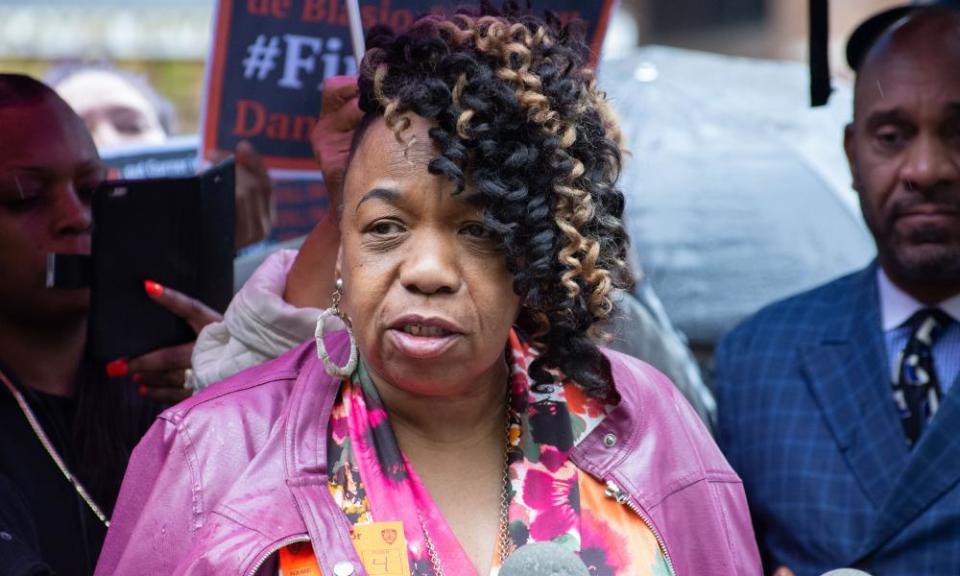NYPD lieutenant texted ‘not a big deal’ after being told of Eric Garner’s death

A senior New York city police officer involved in the arrest of Eric Garner, the African American man who died after being put in a chokehold by a police officer in 2014, told a subordinate that the incident was “not a big deal” immediately after being informed Garner had gone into cardiac arrest and was probably dead, it emerged on Thursday.
Related: Five years on, New York officer who put Eric Garner in chokehold faces trial
The revelation was contained in a series of text messages between Lt Christopher Bannon of the NYPD, who had dispatched officers to Garner’s location, and a sergeant, Dhanan Saminath, who had been present at the scene. They were disclosed as part of a disciplinary trial for officer Daniel Pantaleo, who is accused of placing Garner in a banned chokehold during the arrest, which led to his death almost five years ago.
Lt Bannon appeared before the court in New York and was asked by prosecutors to read the exchange of July 2014 text messages between the two officers, as many members of the public in the room gasped with anger.
The texts showed that Saminath told his superior: “Danny [Pantaleo] and Justin [D’Amico, another officer involved] went to collar Eric Garner and he resisted. When they took him down Eric went into cardiac arrest. He’s unconscious. Might [be] DOA.”
After another short exchange, Bannon replied: “Not a big deal. We were effecting a lawful arrest.”
The death of Garner, 43, who shouted “I can’t Breathe” 11 times during his arrest, led to widespread protests soon after his death and several months later when there were no indictments against the officers involved.
Garner’s mother, Gwen Carr, told the Guardian immediately after the hearing that the text messages were “a pure smack in the face”.

Eric Garner’s mother, Gwen Carr, told the Guardian after the hearing that the text messages were ‘a pure smack in the face’.Photograph: M Stan Reaves/REX/Shutterstock
“For the officer to disregard a human life like that … in other words it was business as usual. Leave him there, do what you want to do, go on about your business. That’s what it felt like to me,” Carr said, adding she had not known of the messages’ existence until they were read in court on Thursday.
During cross examination Bannon defended the remarks as an attempt to calm the officers involved.
“My reasoning behind that text message was not to be malicious, it’s to make sure the officer knew [he] was put in a bad situation,” Bannon said. “To try to bring him down to a level where you put him at ease.”
The lieutenant who, records reveal, has been named as a defendant in at least one other recent use-of-force case, was then asked by prosecutors for the Civilian Complaint Review Board if he thought Eric Garner had also been put in a “bad situation”.
He responded: “I don’t know how to answer that. I don’t know if he was or wasn’t.”
The lieutenant told the administrative court that officers continued to process Garner’s arrest even after he had died.
The hearing, the fourth day of Pantaleo’s trial, revealed new details about the buildup to Garner’s arrest. Bannon told the court that Garner and two other men had been known to authorities for their involvement in the sale of untaxed cigarettes close to an NYPD precinct in the New York City borough of Staten Island.
The lieutenant said he had asked officers to go and investigate a group of six men he had seen on the way to a meeting, whom he suspected of being involved in illegal activity. The officer conceded, however, that he had not seen “the exchange of cigarettes or the exchange of currency” as he drove past.
The small trial room at the NYPD’s headquarters in downtown Manhattan was packed with members of Garner’s family as well as police union officials, including Patrick Lynch, the outspoken president of the Patrolmen’s Benevolent Association and an ardent supporter of officer Pantaleo.
Bannon was asked by Pantaleo’s attorney Stuart London to describe the officer’s background. Bannon described Pantaleo as “one of the best officers I have supervised from lieutenant to sergeant”.
The hearing is set to continue into next week. The harshest punishment Pantaleo faces is being sacked, as the proceedings are not criminal.

